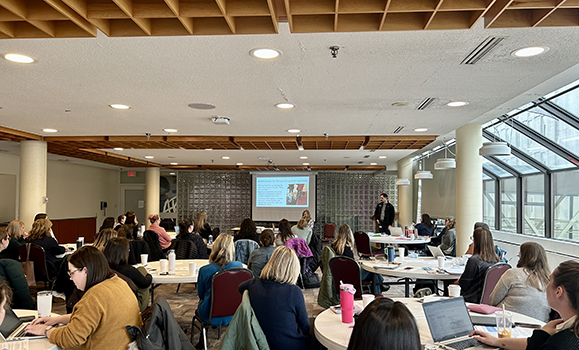A name is called out on a busy night in a crowded hospital emergency room. The person hears the call but canāt get to the check-in desk in time amid the bustle, slowing down their care.
Why? They suffer from low vision or blindness.
A nurse enters a hospital room and begins adjusting an IV tube, surprising the patient when no words are initially exchanged
Whatās the issue? The health-care worker hasnāt identified that the patient has sight loss and thus doesnāt know to tailor their interaction to accommodate for this.
These are just two of the many challenging scenarios people with low vision or blindness may face in a hospital or health-care setting in Nova Scotia and elsewhere. Removing such barriers can take time, but fourth-year Dal medical student Tyler Herod and collaborators in the sight-loss community are doing their part to speed up the search for solutions.
Thereās a lack of recognition of the disability in and of itself
āThereās a lack of recognition of the disability in and of itself, which stems from some level of unconscious bias or ableism,ā says Herod. "When a health-care worker fails to recognize that a patient they are interacting with lives with sight loss, that can lead to problems.ā
What he and his partners have discovered is that in some cases, a little change can yield a big impact.
Turning the tide
Herod first got involved in advocacy work on the issue when he signed up for a project with the (CNIB) as part of Dal Medicineās program. He and two fellow med students were tasked with helping CNIB in its efforts to better understand the barriers faced by people with sight loss when accessing healthcare and to foster positive change.
When the formal part of the project ended, Herod decided to take what heād learned and put it into further action.
Over the past year, he and collaborators have been going into hospitals to offer training sessions for teams of nurses and others on how to interact with individuals with sight loss. The initiative has taken off.
āThe right kind of people have heard about it and then approached me to say, āHey, do you want to do a presentation to our department next?āā

The training sessions typically begin with remarks from an individual living with sight loss. Shelly Adams, manager of community engagement with CNIBĀ NS/PEI and a Dal alum, and Brenda Anderson, a volunteer with CNIB, have both shared their experiences as part of the sessions.
Following that, Herod and the others share general information about sight loss and best practices, including how to perform sighted guide. Participants also get the chance to meet a guide dog during the sessions and learn the rules of engagement for service animals.Ā
"Having the opportunity to educate others about what it is to live with sight loss will make my own experiences at healthcare facilities less stressful," says Anderson.
A practical approach
Herod has also undertaken a few other related initiatives to bring about change, including one designed to help ensure staff in busy hospital environments know when they are caring for someone with sight loss.
āI thought an easy fix would be to create a sign that can be positioned either at the door of a patientās room or on the bed of a patient so that any staff that approaches are aware that this person is living with sight loss,ā explains Herod.Ā
The posters also offer tips on how to interact with such patients, including:
- When approaching me: Please introduce who you are
- When entering my area: Please announce what you are going to be doing
- When delivering food: Please describe where the plate is in the room as well as where the food is located on the plate
- When taking me somewhere: Please offer your arm for me to hold onto
- If you are unsure how to assist me: Please just ask!
The poster initiative is currently being rolled out at two hospitals in Halifax as part of a quality improvement project. Herod hopes to see it spread to other hospitals.
Seeking broader change
While such practical steps are helping make a difference for people with sight loss in the local community, Herod hopes to raise the profile of the issue to broader audiences as well.
A study Herod began with his colleagues during the service-learning project has involved formal one-on-one interviews with individuals in Nova Scotia living with sight loss. Herod hopes the results will be completed by next year.
āThe advantage of doing a formal research study is that it allows us to publish our findings to the broader scientific community,ā says Herod. āWe can also present our results at national conferences to engage with healthcare workers from other provinces.ā
The team hopes to present their research at the 2025 Annual Meeting.

